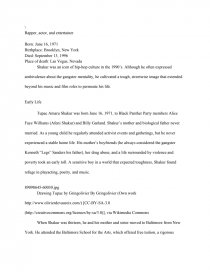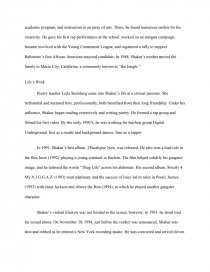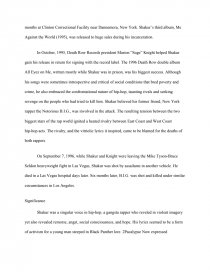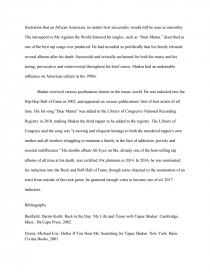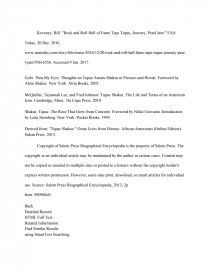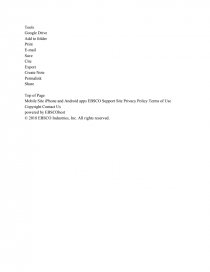Tupac Amaru Shakur - Rapper, Actor, and Entertainer
Essay by creeeeee • May 21, 2018 • Essay • 1,190 Words (5 Pages) • 1,687 Views
Essay Preview: Tupac Amaru Shakur - Rapper, Actor, and Entertainer
\
Rapper, actor, and entertainer
Born: June 16, 1971
Birthplace: Brooklyn, New York
Died: September 13, 1996
Place of death: Las Vegas, Nevada
Shakur was an icon of hip-hop culture in the 1990’s. Although he often expressed ambivalence about the gangster mentality, he cultivated a tough, streetwise image that extended beyond his music and film roles to permeate his life.
Early Life
Tupac Amaru Shakur was born June 16, 1971, to Black Panther Party members Alice Faye Williams (Afeni Shakur) and Billy Garland. Shakur’s mother and biological father never married. As a young child he regularly attended activist events and gatherings, but he never experienced a stable home life. His mother’s boyfriends (he always considered the gangster Kenneth “Legs” Sanders his father), her drug abuse, and a life surrounded by violence and poverty took an early toll. A sensitive boy in a world that expected toughness, Shakur found refuge in playacting, poetry, and music.
89098645-60030.jpg
Drawing Tupac by Gringolivier By Gringolivier (Own work http://www.olivierdevaureix.com/) [CC-BY-SA-3.0 (http://creativecommons.org/licenses/by-sa/3.0)], via Wikimedia Commons
When Shakur was thirteen, he and his mother and sister moved to Baltimore from New York. He attended the Baltimore School for the Arts, which offered free tuition, a rigorous academic program, and instruction in an array of arts. There, he found numerous outlets for his creativity. He gave his first rap performance at the school, worked on an antigun campaign, became involved with the Young Communist League, and organized a rally to support Baltimore’s first African American mayoral candidate. In 1988, Shakur’s mother moved the family to Marin City, California, a community known as “the Jungle.”
Life’s Work
Poetry teacher Leila Steinberg came into Shakur’s life at a critical juncture. She befriended and nurtured him; professionally, both benefited from their long friendship. Under her influence, Shakur began reading extensively and writing poetry. He formed a rap group and filmed his first video. By the early 1990’s, he was working for hip-hop group Digital Underground, first as a roadie and background dancer, then as a rapper.
In 1991, Shakur’s first album, 2Pacalypse Now, was released. He also won a lead role in the film Juice (1992), playing a young criminal in Harlem. The film helped solidify his gangster image, and he tattooed the words “Thug Life” across his abdomen. His second album, Strictly 4 My N.I.G.G.A.Z. (1993) went platinum, and the success of Juice led to roles in Poetic Justice (1993) with Janet Jackson and Above the Rim (1994), in which he played another gangster character.
Shakur’s violent lifestyle was not limited to the screen, however; in 1993, he stood trial for sexual abuse. On November 30, 1994, just before the verdict was announced, Shakur was shot and robbed as he entered a New York recording studio. He was convicted and served eleven months at Clinton Correctional Facility near Dannemora, New York. Shakur’s third album, Me Against the World (1995), was released to huge sales during his incarceration.
In October, 1995, Death Row Records president Marion “Suge” Knight helped Shakur gain his release in return for signing with the record label. The 1996 Death Row double album All Eyez on Me, written mostly while Shakur was in prison, was his biggest success. Although his songs were sometimes introspective and critical of social conditions that bred poverty and crime, he also embraced the confrontational nature of hip-hop, taunting rivals and seeking revenge on the people who had tried to kill him. Shakur believed his former friend, New York rapper the Notorious B.I.G., was involved in the attack. The resulting tension between the two biggest stars of the rap world ignited a heated rivalry between East Coast and West Coast hip-hop acts. The rivalry, and the vitriolic lyrics it inspired, came to be blamed for the deaths of both rappers.
On September 7, 1996, while Shakur and Knight were leaving the Mike Tyson-Bruce Seldon heavyweight fight in Las Vegas, Shakur was shot by assailants in another vehicle. He died in a Las Vegas hospital days later. Six months later, B.I.G. was shot and killed under similar circumstances in Los Angeles.
Significance
Shakur was a singular voice in hip-hop, a gangsta rapper who reveled in violent imagery yet also revealed remorse, angst, social consciousness, and hope. His lyrics seemed to be a form of activism for a young man steeped in Black Panther lore. 2Pacalypse Now expressed frustration that an African American, no matter how successful, would still be seen as unworthy. The introspective Me Against the World featured hit singles, such as “Dear Mama,” described as one of the best rap songs ever produced. He had recorded so prolifically that his family released several albums after his death. Successful and critically acclaimed for both his music and his acting, provocative and controversial throughout his brief career, Shakur had an undeniable influence on American culture in the 1990s.
Shakur received various posthumous honors in the music world. He was inducted into the Hip-Hop Hall of Fame in 2002, and appeared on various publications' lists of best
...
...
